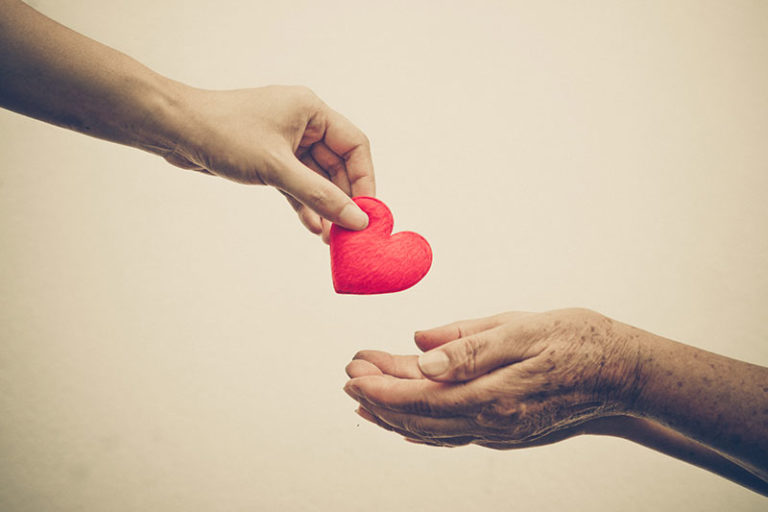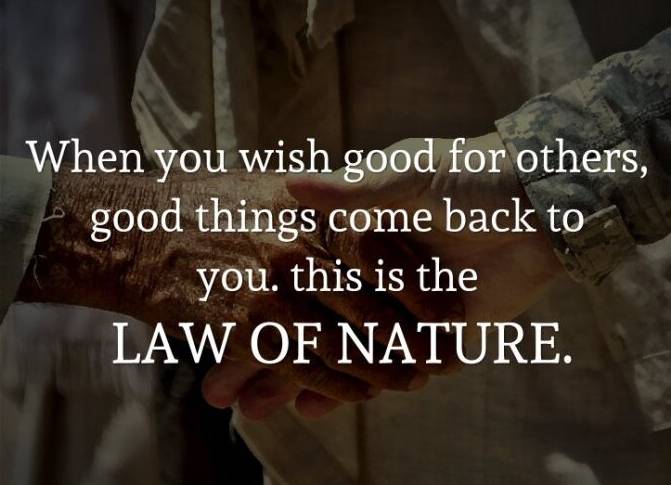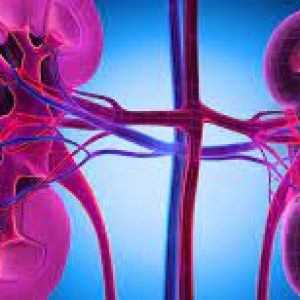Doing Good To Others Is Doing Good To Self. The Selfless Service to Mankind!

What Goes Around Comes Around
Doing good to others is doing good to yourself. I believe that we are all born with an inherent urge to help others. With certainty, I can say, assistance to others does not have to be monetary. A prayer, a kind gesture, volunteering once a year, contributing a few bucks, clothing, and non-perishable items all add up and make a difference in someone’s life. Additionally, and selfishly, when I assist somebody, my spirit gets ignited! Naturally, I am perpetually humbled; yet, my gratitude for life continually increases, and I am energised to serve more!!
Finally, regardless of how you can assist, I invite you to ponder the “H” in Enthusiastic Living this week. Not only will you be assisting another person, but you will also be assisting yourself! The following is an enlightening essay from www.eastsidewriters.com that discusses the numerous benefits of helping others, as well as what happens when you add just one degree (action) to your life or the life of another. It’s all VERY GOOD!
Your success in life is contingent upon your ability to be gentle with children, compassionate with the elderly, empathetic with the striving, and tolerant of the weak and strong. Because you will have been all of these at some point in your life.
While being nice has a huge effect on the lives of others, you may be unaware of the great health benefits it provides you. Individuals who commit acts of kindness will agree that being kind to others makes them “feel good.” The scientific study demonstrates that being nice makes you feel good and has major physical and mental health benefits.
Assisting others helps maintain good health and can help mitigate the effects of serious and mild diseases and disorders, psychological and physical.
After completing a good act, a rush of exhilaration is followed by a lengthier time of tranquilly. This is frequently referred to as a “helper’s high,” because it involves bodily sensations and the release of the body’s natural analgesics, endorphins. This first rush is followed by a time of sustained emotional well-being.
After committing acts of kindness or doing good, stress-related health problems improve. Helping others alleviates depression, provides social contact and reduces emotions of animosity and loneliness, which can result in stress, overeating, ulcers, and other health problems. Reduced stress may alleviate the tightness of the lungs that causes asthma episodes in some people.
Assisting others by doing good can boost our sensations of joy, emotional resilience, and vitality and alleviate an unpleasant sense of isolation. Physical discomfort can be reduced in both severity and awareness.
The prevalence of negative attitudes, such as persistent animosity, that stimulate and harm the body is decreased. Health benefits and a sense of well-being are felt for hours, if not days after the helpful act is remembered.
It is possible to gain a higher sense of self-worth, increased happiness and optimism, as well as a reduction in emotions of helplessness and depression. When we form an “affiliative connection” with another person – whether through friendship, love, or some other form of positive bonding – we experience feelings that can help improve the immune system.
Caring for strangers has enormous immunological and therapeutic effects. Attending a club, volunteering, entertaining, or attending a church group on a regular basis provides the same level of enjoyment as earning a college degree or more than doubling your salary.
Deliver Selfless Service
True love manifests itself through selfless service. We all know that a mother’s love for her kid is the greatest in the world. The mother’s love for her child is so strong that she will automatically make all types of sacrifices to ensure that the youngster is happy. She’ll have to feed the youngster at all hours of the night. To care for the child, she will forego many of her own activities. Rather than spending money on herself, the mother will put it toward the child’s needs. No one tells the mother that she has to make these sacrifices. It originates from the depths of her soul. She does not expect anything from the child in return. She provides because it is in her nature to do so.
True unselfish service encompasses more than just our immediate family; it encompasses all of humanity. Having feelings of love for all individuals, both those we know and those we don’t is a high trait. One of spirituality’s purposes for humanity is to improve the quality of love and service to all. According to the Sufis, God created humans to love and serve others. He has angels if He only needed dedication. Humans, on the other hand, are the only creatures with the divine capacity to love and serve others and with doing good for mankind. This capacity is required to become a complete human being.

Selfless Service’s Advantages
We are confronted with a conundrum when it comes to selfless service. To really provide selfless service, one must act without expecting anything in return. It is freely provided, inspired by a natural desire to serve others. When helping others, one forgets about one’s own needs and wants, as well as one’s own comfort and safety. There are even individuals who are willing to sacrifice their own life in order to save others. People that are truly unselfish do not expect anything in exchange for their actions. The underlying contradiction of selfless service is that it evokes the highest reward – the Lord’s delight — despite the fact that it requires no recompense.
This advantage may appear to be intangible. It is, nevertheless, the best gift we can receive in life for those of us who are engaged in spiritual development. When one sits in the solitude of one’s own self and finds the inner door of light, love, and peace open with ease, one reaps the rewards. These treasures overwhelm unselfish souls with inner joy and fulfilment that surpasses anything we may get from worldly accomplishments. Sant Darshan Singh used to declare that the reward of doing selfless service is equal to the benefit of spending the same amount of time in meditation.
Nonviolence, honesty, purity of heart, and humility all contribute to the mental serenity essential for good meditation experiences. However, unselfish service gives the element of grace, which aids in the opening of the inner gates. Serving humans, animals and being passionate about all living objects is nothing but doing good.
Our hearts expand when we serve others. It extends its arms to hug another human being as a part of the same human family. This act alone has the ability to open up our spirit. God’s love for us might come in as our love for others flows out. Our soul currents begin to rise as a result of this interchange, and we are able to sense the divine light within us. Our meditations become more effective, and our soul, which is filled with serenity and joy, ascends to greater levels of consciousness. As a result, we accelerate our development toward inner serenity and bliss by providing unselfish service.
By selflessly serving others, we expand our hearts beyond ourselves to include our family, community, country, globe, and, ultimately, the cosmos. Selfless service springs from a recognition that we are all members of God’s large family. True unselfish service encompasses more than just our immediate family; it encompasses all of humanity. Having feelings of love for all people, both those we know and those we don’t is a wonderful attribute. One of the spirituality’s purposes is to assist all humanity in developing the quality of love and service to all.
People who have given of themselves have contributed to the improvement of the planet’s quality of life. Some people have worked tirelessly throughout history to cure diseases or to discover and invent new ways to make people’s lives easier and safer. Others have lost their lives in the name of others’ freedom and rights. Some people have dedicated their lives to helping others grow spiritually. Each of us can make a selfless contribution to making the world a better place for all life by using our God-given talents, knowledge, and skills in our own area.
The Strength of Selfless Service
Selfless service is not simply a job or a chore to be completed; it is an act of healing, opening hearts, and spreading love, as Sant Rajinder Singh explains.
Serving others is one of the best acts a human being can perform. When we offer without expecting anything in return, this is the truest form of selfless service. That is the spirit in which we should make our contributions. This means that we do not publicly announce our actions in order to garner acclaim, praise, power, or name and fame. Rather than that, we serve from the bottom of our hearts in the spirit of service to others because it is the proper thing to do as children of the all-giving Creator. This mindset possesses the capacity to heal. This inaction is doing good.
Selfless service is more than a duty to be completed; it is an act of healing, opening hearts, and spreading love. It is an incalculable gift that distributes love and healing in every direction we travel. The giver’s heart is soothed, healed, and overflowing with love. Additionally, donating heals the recipients’ hearts by introducing them to the humanity of others.
When we give, we never lose. Several times throughout our lives, we may have had the opportunity to give something to someone in need, making a sacrifice, only to discover that it was either returned to us or that our circumstances changed and we no longer needed to give it away. Nonetheless, we were rewarded with the satisfaction of having made a sacrifice for others. We sense God’s blessings falling on us. We praise God that we have chosen to be selfless rather than selfish.
When we are self-centred, we frequently experience regret and remorse. We are perpetually remorseful for not giving. One, on the other hand, never regrets or feels remorse forgiving. There is no greater joy than giving. Anyone who has ever given selflessly knows that giving never results in a loss. They discover that benefits continue to pour down upon them without their request, and their hearts are filled with divine love.

Contribute from the heart
How often do we perform acts of kindness solely to impress others? Do we find that we talk respectfully and kindly to our bosses yet verbally insult our coworkers or subordinates in our offices? How many of us donate only when we are on display for others to see our generosity, yet walk coldly past a beggar in the solitude of a street?
Let us offer from the depths of our souls. Our mind gives for self-serving purposes. It craves recognition from others. Also, it desires the respect of others. It wishes to demonstrate its goodness and love in a grandiose manner, whereas in reality, it is self-serving. The soul provides just for the purpose of giving. Soul contributes without expecting anything in return. It is not even interested in being recognised for what it has done. When the soul offers, it is a manifestation of God inside us. As God desires nothing in exchange for the marvellous gifts of creation given on all forms of life, the soul gives selflessly by doing good.
If we wish to be in sync with God, then let us offer from the soul, selflessly, tenderly, without pomp and circumstance. We are just interested in serving and alleviating the misery of others. That is self-giving and has the capacity to cure others. By doing good you become sure of this.
Spiritual growth through service
Spiritual development entails instilling higher life values. This entails keeping an eye on our ideas, words, and actions to ensure that we think, speak and behave ethically. Spiritual life entails both pondering to discover God within and living an ethical life without. It is stated that living an ethical life serves as a gateway to spirituality. Ethical life requires cultivating virtues such as nonviolence, humility, universal love, and selfless service.
When we live a life of service with a gentle and patient attitude, we inspire not just those with whom we work, but also those who do not lead a spiritual life. Others who are fascinated by spirituality or have a deep interest in it will notice something about us. They will notice our composure and composure and will observe our nonviolent, loving, and humble approach to life’s issues. They will also notice how selflessly we give of ourselves.
These characteristics will attract others who aspire to live a similar life. Thus, it is critical that we serve as examples and role models for spiritual principles in our daily lives. Doing good really counts as much.
Selfless service helps us grow spiritually. Our words and deeds are the results of our ideas. If we have thoughts in which we wish to assist others, our words and actions will reflect that. If we want to preach the virtue of selfless service, we must demonstrate it ourselves. Let us serve selflessly and set an example, rather than instructing or criticising others on how to serve. Let us instil in our life the purest form of unselfish service of doing to others.
Meditation can also be beneficial because as we sit in stillness and look within, we notice that the same Light of God that is within us is also within everyone else. We recognise that we are all members of God’s family. We recognise that all souls are members of the same team – God’s team. Each of us is interconnected. Thus, if one of us is in difficulty, we are all in difficulty. If one of us is in pain, we are all in pain. If one of us loses, we all lose. Rather than losing, we should all strive to win. If we possess the abilities to win, then by assisting others in becoming winners, we all win, and we become genuine winners.
Additionally, we recognise that regardless of our disparate backgrounds, we are all members of God’s family. This attitude of embracing and loving those who are different from us is a critical component of selfless service.
Do not rely on others being friendly. Demonstrate how.” ~Unknown
My father used to tell me when I was a teenager, right about the time I thought I knew everything, that I only recalled the unpleasant things.
When I shared stories about my family, they weren’t about beach excursions, picnics, or vacations; they were about unpleasant recollections and all the ways my childhood had harmed me.
The same could be said about friends and significant events in my life. I was constantly recalling and rehashing the worst memories.
Indeed, throughout college, I followed each initial handshake with a dramatic recital of my past, highlighting a laundry list of grievances against those who had wronged me.
While not everyone is as pessimistic or needy as woe-is-me-younger me, I’ve discovered that many of us share a trait with my erroneous prior self: we focus far more on how we’ve been harmed than on how we’ve been benefited.
Psychologists argue that we moan to some extent in order to connect with others who understand the universal issues we all face (though in some cases, complaining is a constructive way to find solutions to problems as opposed to a chronic need to vent negativity). However, I believe there is more to it.

When we moan about everything that has gone wrong or about everyone who has wronged us, we wallow in our self-pity.
It’s a pandemic in an individualistic culture where self-reliance, autonomy, and the pursuit of personal prosperity may leave us alienated and under pressure to achieve. This may not be true for everyone, but I know that when I’m caught up in moaning, nine times out of ten what I need to do is quit obsessing over my life’s conditions.
It took me a long time to discover this, but we do not have to live our lives in continual reaction to what appears to be tough or unfair. We do not have to be victims of bad things that happen to us. Our lives do not have to be the sum of our difficulties—at least not if we take responsibility for bringing about positive change in the world.
This begins with cultivating a better awareness of our connection. We are not alone in this. The world is not against us, and we are not required to be antagonistic against one another. We do not have to let our worries, insecurities, and desires boil over within us to the point that we become a swarm of incompatible hazardous substances ready to explode the moment we collide.
You can always find a negative storey to tell about another person being insensitive, greedy, uncaring, unfair, or simply incorrect. Additionally, you can uncover an underlying conflict that does not justify but may explain their actions.
If you’re unable to channel your compassion and tolerance, you can always locate one positive thing that someone accomplished that day.
When that stranger held the elevator door open for you, when your coworker allowed you to take the lead in your meeting, when your father called to express her love for you; these are all reminders that people care about you—perhaps not all of them, and perhaps not all of the time, but probably more than you realise. These are small acts and gesture of doing good.
An even more meaningful way to acknowledge our interconnectedness is to become someone else’s good tale. Be the act of compassion that demonstrates to another person that the world is not against them. Provide them with a source of hope that they can return to if their circumstances become overwhelming.
If you’ve ever ended a difficult day with a long hug—the kind that’s so wanted and loving that it’s nearly impossible to resist relaxing and receiving—you understand the power of a simple gesture.
These are a few of my favourite suggestion
1. Approach people with an open mind and avoid forming snap judgments, which are frequently incorrect in any case.
2. Express your gratitude to them.
3. Any act performed for the benefit of another person is a kind act if there is no expectation of reciprocation.
4. Take small steps such as holding doors open or allowing people to enter or exit first. Small gestures can make a significant difference to someone who is having a bad day.
5. Accept them for who they are and their aspirations.
6. Inform them that they have brought a grin to your face.
7. Be present when they require assistance. Allow them to be free for the remainder of their time.
8. Inform them of the truth.
9. Explain to them how they make a difference in your life that no one else can—how their unique brand of “special” makes the world a better place for everyone they encounter.
10. Assist them in becoming self-sufficient.
11. Believe in them and instil hope in them.
12. Offer a simple, well-intentioned smile.
13. The most selfless act you can perform is to look after your own mind, body, and spirit. This enables all forms of kindness.
14. Invest time in listening with the intention of gaining knowledge. I joined an art guild composed primarily of older artists with incredible life experiences and the best techniques and tricks for creating artwork. I feel as though I’m getting a lot more for doing nothing more than enjoying their company!
15. The greatest lesson my parents ever taught me—the Golden Rule: treat others as you wish to be treated!
16. Be there for them when they stumble rather than saying I warned you so.
17. Allow them space to exist.
18. Lend your shoulder to those in need of solace.
19. Express gratitude for their uniqueness.
20. Take the time to write someone a note of appreciation for anything they’ve done for you previously. For instance, a good teacher or manager, or a mentor or role model.
21. Show each individual respect for his or her uniqueness. (Shirley Wright)
22. Encourage others following a failure. Acceptance of even the strangest possessions. A tap to acknowledge a job well done. A heartfelt “thank you” for every innocuous yet life-changing experience.
23. Pardon. The kind of solace that is generated is unbelievable.
24. Pay them attention. From the store clerk to your children at home, the majority of people simply want to be heard and acknowledged. While comprehension will come later, everyone may pay attention today.
25. Take the time to listen to someone without attempting to solve their situation.

Conclusion
“If you desire happiness for an hour, take a nap,” says a Chinese proverb. Go fishing if you want to be happy for a day. If you want a year of bliss, inherit a fortune. Help someone if you want to be happy for the rest of your life.” Happiness is found in helping others, as the best thinkers have suggested for millennia. Keep on doing good to others.
For it is in giving that we receive — Saint Francis of Assisi
The sole meaning of life is to serve humanity — Leo Tolstoy
We make a living by what we get; we make a life by what we give — Winston Churchill
Giving back is as good for you as it is for those you are helping because giving gives you purpose. When you have a purpose-driven life, you’re a happier person — Goldie Hawn
Ponder upon your thoughts. What is the most selfless act you can perform for another person?
To do nothing because you can only do a little is the gravest of all errors — do what you can.
Take a week to think creatively and consider all of the ways you may help others. Everything counts and always has an impact on a life, whether it’s a prayer, a kind gesture, volunteering, or a donation.
Note: Contact our Writers at www.eastsidewriters.com for writing Blogs/Articles on any niche. We have experts in various domains from Technology to Finance and from Spirituality to Lifestyle and Entertainment.







Pingback: Develop mental calmness like a monk and enjoy a serene and blissful existence! - Eastside Writers